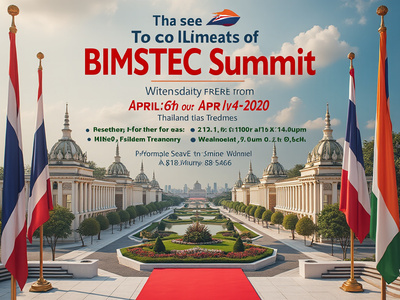
Thailand Enhances Efforts to Attract Indian Investment in High-Tech Sectors
Thailand’s Board of Investment targets key sectors including medical devices, electric vehicles, and semiconductors to bolster its position as a technological hub in Southeast Asia.
Thailand's Board of Investment (BOI) has recently engaged in a successful outreach mission to India with the objective of attracting significant investments in high-technology sectors, notably medical devices, electric vehicles (EVs), and semiconductors.
This initiative supports Thailand’s goal of becoming a key player in future industries within Southeast Asia.
BOI Secretary-General Narit Therdsteerasukdi led the delegation, which conducted high-level discussions with 15 major Indian companies in the cities of Hyderabad and Mumbai from March 24 to 27. During these discussions, the BOI emphasized Thailand's strategic advantages as an ideal investment destination, particularly in sectors where India has established global leadership.
The pharmaceutical and medical device sector garnered the most attention.
The BOI highlighted investment incentives and initiatives emerging from Thailand’s medical hub during meetings at the Medical Device Park.
Sahajanand Medical Technologies, a prominent Indian cardiovascular device manufacturer, has expressed intentions to set up a production and research and development facility in Thailand focused on artificial heart valves and stents.
Similarly, global pharmaceutical firm MSN Laboratories has indicated plans to invest in research and to expand its presence in the ASEAN market.
ACG Capsules, a leader in capsule and pharmaceutical machinery production, is planning to establish a local R&D centre following its previous investment of 2.1 billion baht in a factory in Rayong.
Natural Remedies, a major producer of herbal livestock feed supplements, aims to collaborate with Thai universities and meat producers on research initiatives.
In the automotive sector, discussions with Tata Motors revolved around the company's ambitions for EV and commercial vehicle expansion, especially targeting right-hand drive markets.
Tata Motors has recently appointed a senior executive from a prominent Thai automaker to lead its international passenger car business.
Concerning the semiconductor industry, the BOI engaged with the India Electronics and Semiconductor Association (IESA), which represents over 400 companies.
The discussions included the presentation of government policies, semiconductor board initiatives, and workforce development plans in Thailand.
The IESA and BOI are set to co-host investment promotion activities in Bangalore, a global hub for semiconductors, later in October.
Notably, Tessolve Semiconductor, a chip design and testing firm, has plans to open a testing and engineering services centre in Thailand by the year's end.
India, rapidly emerging as an economic powerhouse and technological leader, is actively pursuing overseas investments under its “Act East Policy.” Narit Therdsteerasukdi remarked that this mission aimed to showcase Thailand's potential in high-tech industries, encouraging Indian investors to consider Thailand as their ASEAN base for manufacturing, R&D, and logistics while fostering collaboration in science and technology workforce development.
The timing of this investment drive aligns with Indian Prime Minister Narendra Modi's scheduled visit to Thailand on April 4-5, reflecting the strengthening bilateral relationship and a mutual commitment to economic cooperation.
Over the past decade, the BOI has approved 161 investment projects from Indian firms, totaling over 13 billion baht, predominantly in the sectors of pharmaceuticals, medical devices, chemicals, and jewellery.
This initiative supports Thailand’s goal of becoming a key player in future industries within Southeast Asia.
BOI Secretary-General Narit Therdsteerasukdi led the delegation, which conducted high-level discussions with 15 major Indian companies in the cities of Hyderabad and Mumbai from March 24 to 27. During these discussions, the BOI emphasized Thailand's strategic advantages as an ideal investment destination, particularly in sectors where India has established global leadership.
The pharmaceutical and medical device sector garnered the most attention.
The BOI highlighted investment incentives and initiatives emerging from Thailand’s medical hub during meetings at the Medical Device Park.
Sahajanand Medical Technologies, a prominent Indian cardiovascular device manufacturer, has expressed intentions to set up a production and research and development facility in Thailand focused on artificial heart valves and stents.
Similarly, global pharmaceutical firm MSN Laboratories has indicated plans to invest in research and to expand its presence in the ASEAN market.
ACG Capsules, a leader in capsule and pharmaceutical machinery production, is planning to establish a local R&D centre following its previous investment of 2.1 billion baht in a factory in Rayong.
Natural Remedies, a major producer of herbal livestock feed supplements, aims to collaborate with Thai universities and meat producers on research initiatives.
In the automotive sector, discussions with Tata Motors revolved around the company's ambitions for EV and commercial vehicle expansion, especially targeting right-hand drive markets.
Tata Motors has recently appointed a senior executive from a prominent Thai automaker to lead its international passenger car business.
Concerning the semiconductor industry, the BOI engaged with the India Electronics and Semiconductor Association (IESA), which represents over 400 companies.
The discussions included the presentation of government policies, semiconductor board initiatives, and workforce development plans in Thailand.
The IESA and BOI are set to co-host investment promotion activities in Bangalore, a global hub for semiconductors, later in October.
Notably, Tessolve Semiconductor, a chip design and testing firm, has plans to open a testing and engineering services centre in Thailand by the year's end.
India, rapidly emerging as an economic powerhouse and technological leader, is actively pursuing overseas investments under its “Act East Policy.” Narit Therdsteerasukdi remarked that this mission aimed to showcase Thailand's potential in high-tech industries, encouraging Indian investors to consider Thailand as their ASEAN base for manufacturing, R&D, and logistics while fostering collaboration in science and technology workforce development.
The timing of this investment drive aligns with Indian Prime Minister Narendra Modi's scheduled visit to Thailand on April 4-5, reflecting the strengthening bilateral relationship and a mutual commitment to economic cooperation.
Over the past decade, the BOI has approved 161 investment projects from Indian firms, totaling over 13 billion baht, predominantly in the sectors of pharmaceuticals, medical devices, chemicals, and jewellery.











